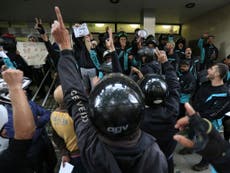Forty years on from the winter of discontent, Corbyn aims to put unions back on top once again – we should be terrified
The Labour leader’s rise shows you can’t inoculate a population against socialism

It is now 40 years since the beginning of the winter of discontent, and a little over 20 years since the Conservatives finally squeezed the last few drops of propaganda value from it.
In case you’re unfamiliar with those events, they basically ended the last Labour government before Blair’s and acted as a sort of funeral pyre for the old “post-war consensus” that set the preservation of full employment, the welfare state and a mixed (public/private) economy as the prime domestic policy objectives of every government of either party.
What brought the government of James Callaghan so low – and a few months later helped Margaret Thatcher to begin what turned out to be 18 years of uninterrupted Tory rule – was a series of strikes across industries and public services in every corner of the nation. Hence the discontent. I was in sixth form at the time, and remember the mixed blessing of being given time off school because the coal for the boilers hadn’t been delivered and the caretakers and dinner ladies hadn’t tuned up (more time to watch Crown Court or Rainbow; less time for A-level economics or English literature).
The point about the strikes was that they were against what was called “pay policy”. This was the government attempting to limit pay rises to reduce inflation and contain job losses – as an alternative to using mass unemployment to keep wages low. The unions rejected pay policy – and got mass unemployment instead. They did not prosper under the Conservatives. Ask the miners.
It felt like everyone was on strike. It was the time when “the dead went unburied”. In fact, that was confined to Liverpool, where some poorly paid gravediggers took industrial action, but that was bad enough. Ford car workers, ambulance staff, the bakers, lorry drivers, petrol-tanker drivers, bin men – the lot were out. Just for a change the coalminers stayed at work, but the nation still suffered.
The strikes weren’t all simultaneous – it was not a general strike – but together they ranged from life-threatening to inconvenient. It was certainly a concentration of industrial action that caused disruption, shortages and chaos. There was a mood in the country that we couldn’t carry on like this, trying to live beyond our means – “Labour Isn’t Working”, in the Tory election slogan – and that the old ways had failed.
The strikes proved what people had known for about 20 years – that the trades unions were too powerful. Their membership peaked in 1979, at more than 13 million; Thatcher soon began the long job of cutting them down to size. Today it’s about half that, and the unions are irrelevant.
The winter of discontent was in fact simply an unusually virulent outbreak of bad industrial relations: the various disputes, in their length and scope, seem unbelievable from today’s perspective. Traditionally the newspaper and the car industry were two hotbeds of discontent and 1978-79 was no exception. Difficult as it may be to think possible, the British Leyland factory in Speke didn’t produce a single TR7 sports car (supposedly a great dollar export earner) for about a year between 1977 and 1978, before the plant was finally shut.
It was not the only year-long stoppage. The Times, that great symbol of the establishment, the “paper of record”, underwent the humiliation of not appearing for almost a year between December 1978 and November 1979. Shortly after it resumed publication it was offloaded to Rupert Murdoch, and the rest, as they say, is misery.
Today, Britain’s peaceable industrial relations, low incidence of strikes and flexible labour market are among its few strong competitive advantages – with unemployment rates running well below those in Europe, for example (and not like 1979).
But could something like the nightmare of the winter of discontent return? Yes, for sure.
First, so-called hard Brexit could create a similar impression and reality of decline and disorder, and expose the gross incompetence of the government. Whatever the merits of an administration that presides over such a situation, it has little chance the next time the electorate is asked to pass a verdict upon it.
A closer analogy, though, is what would befall the country under a government led by Jeremy Corbyn. For, as the rise of Corbyn demonstrates, you can never inoculate a population against socialism.
The 2017 Labour manifesto sets out a terrifying agenda for a resumption of union power. A few examples will suffice. First, national sectoral bargaining would mean that, say, a dispute at a single bus depot in Stafford or Glasgow could result in a national wave of industrial action that would stop every bus service in Britain. The same goes for the railways, for car workers, for care workers, for bank staff – anyone you care to mention.
Second, the automatic right to recognition would mean the trades unions would see a massive increase in membership, and thus power, coupled to sectoral (that is, wider than one company) bargaining. That would allow them to blackmail companies, industries and the nation to extract uneconomic pay rises and crush the profitability of British commerce, with predictable effects – ones we have suffered before.
We learned hard lessons about this sort of thing in that exceptionally cold and harsh winter of 1978-79. Who knows what the unions will demand of Corbyn next? Secondary picketing – where unaffected premises can be blockaded by mass violent protest and intimidation; “sympathy” strikes, where workers in one industry take action over an entirely unrelated dispute; paying strikers housing benefit and social security while they’re not at work; the closed shop, which means you have to join a union to be employed, and thus the union can sack you: all could return under a socialist government. Don’t let Britain have to learn those painful lessons again, the hard way.






Join our commenting forum
Join thought-provoking conversations, follow other Independent readers and see their replies